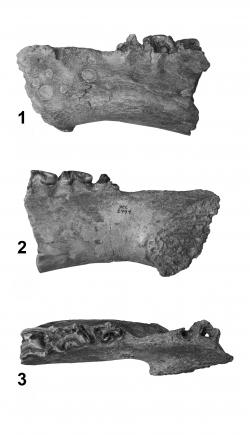
Sir Mick Jagger has a new animal named after him. Scientists have named an extinct swamp-dwelling creature that lived 19 million years ago in Africa after the Rolling Stones frontman, in honor of a trait they both share -- their supersized lips.
“We gave it the scientific name Jaggermeryx naida, which translates to ‘Jagger’s water nymph,’” said study co-author Ellen Miller of Wake Forest University. The animal’s fossilized jaw bones suggest it was roughly the size of a small deer and akin to a cross between a slender hippo and a long-legged pig.
Researchers uncovered the fossils -- consisting of multiple jawbone fragments -- amid the sand dunes and eroded rock of a remote site in the Egyptian desert.
The creature belonged to a family of extinct hoofed animals called anthracotheres. Jaggermeryx is one of six species of anthracotheres found at the site. What distinguished it from other members of this family was a series of tiny holes on either side of its jaw that held the nerves providing sensation to the chin and lower lip.
“The animal probably had a highly innervated muzzle with mobile and tactile lips, thus the Jagger reference,” said Duke University paleontologist and study co-author Gregg Gunnell.
The Egyptian site where the fossils were found is mostly desert today, but geological data suggest that millions of years ago it was a lush tropical delta crisscrossed by rivers and swampland.
Preliminary measurements of the relative amounts of different isotopes in the animal's bones suggest that it probably ate plants.
“It may have used its sensitive snout to forage along river banks, scooping up plants with its lower teeth and large lips,” Miller said.
The Jaggermeryx fossils, which now reside in collections at Duke, the Cairo Geological Museum and Cairo University, were found alongside fossilized catfish, turtles, waterbirds and crocodile poop.
“Some of my colleagues suggested naming the new species after Hollywood star Angelina Jolie, because she also has famous lips. But for me it had to be Mick,” said Miller, who recently read the autobiography of Jagger’s musical partner Keith Richards.
“I was a HUGE Rolling Stones fan in my day," Gunnell said. "'Exile on Main Street’ and ‘Let it Bleed’ were my favorite albums.”
Supported by the National Science Foundation, the findings are scheduled to appear in the Sept. 8 2014 issue of the Journal of Paleontology.
Study authors also include Mohamed Gawad, Mohamed Hamdan, Ahmed El-Barkooky and Safiya Hassan of Cairo University and Mark Clementz of the University of Wyoming.
CITATION: "Anthracotheres from Wadi Moghra, early Miocene, Egypt," Miller, E. and Gunnell, G., et al. Journal of Paleontology, 88(5) 2014. DOI: 10.1666/13-122